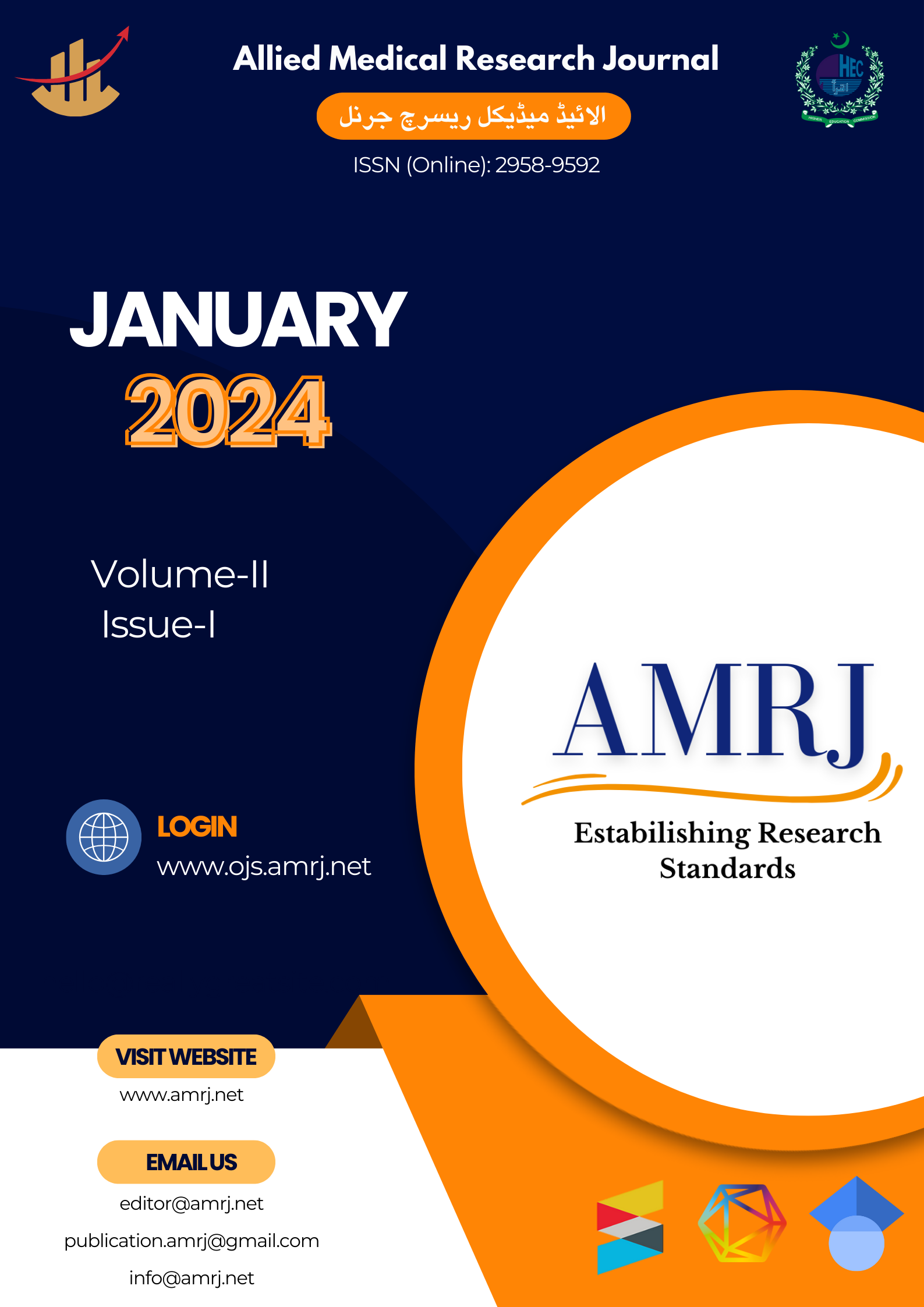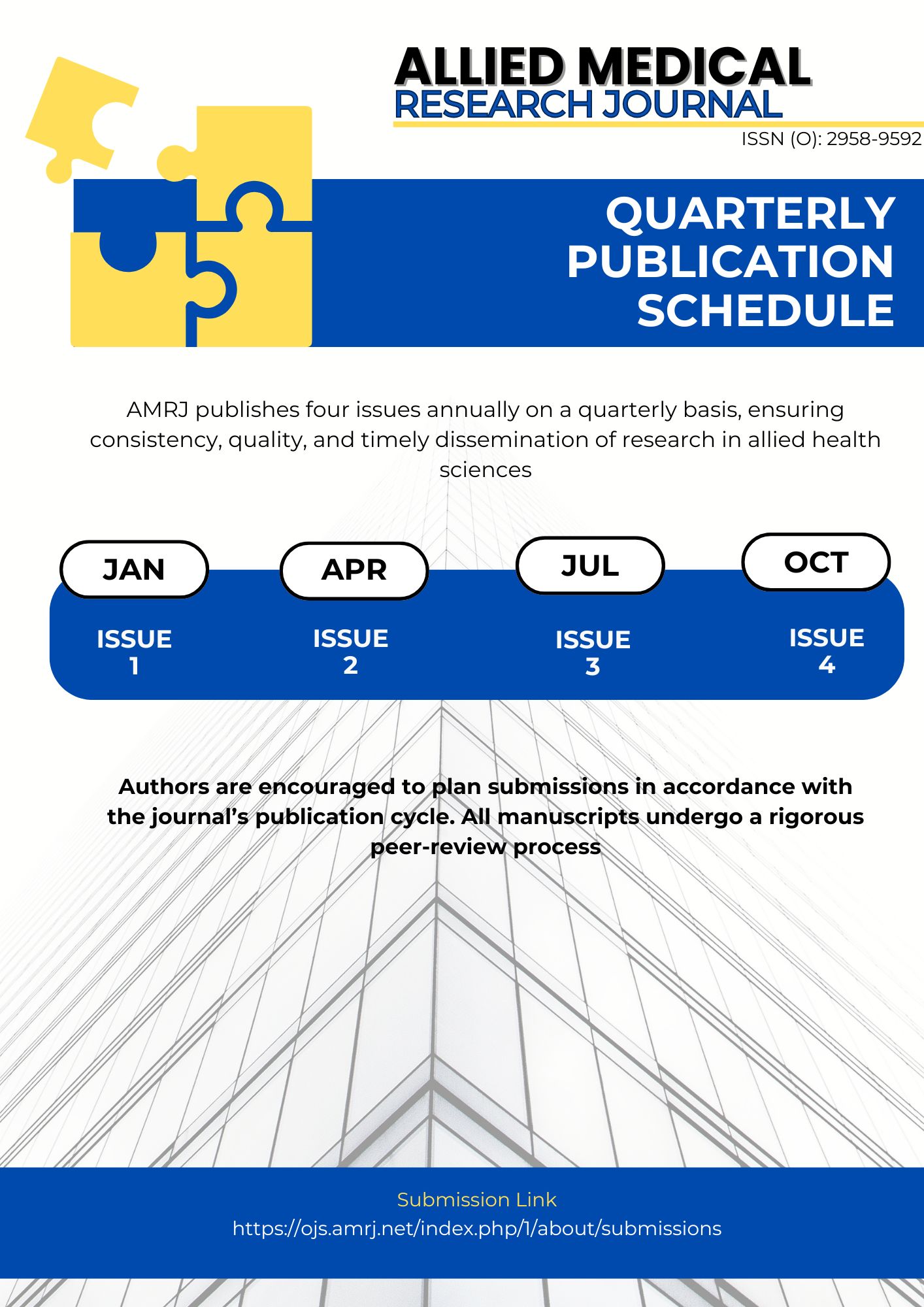Association between Attachment Styles and Depression Severity in Young Adults from Divorced or Single-Parent Households: A Cross-Sectional Study
Attachment Styles and Depression in Young Adults
Keywords:
Major Depressive Disorder, Mental Health, Parent-Child Relations, Young AdultAbstract
Background: Early attachment experiences significantly influence cognitive schemas and interpersonal connections. Depression, affecting 280 million globally, has genetic and environmental origins. The link between childhood attachment styles and depression is extensively researched, emphasizing the need for targeted interventions.
Methods: Adhering to STROBE guidelines, the study includes 165 participants aged 18 to 30, diagnosed with major depressive disorder. Data collection involves ECR-R for attachment styles and BDI-II for depression severity. Statistical analyses include frequency distributions and chi-square tests.
Results: Demographic findings revealed a diverse sample, primarily university students from divorced families. Attachment styles distribution indicates a balance between secure and dismissing patterns. Depression severity is notably moderate. Secure attachments correlate with lower instances of severe depression, while preoccupied and fearful styles predict higher severity.
Conclusion: The study underscores the intricate link between attachment styles and depression severity in young adults from divorced or single-parent households. Secure attachments show protective effects, emphasizing the lasting impact of early experiences.
References
Kumashiro M, Arriaga XB. Attachment security enhancement model: Bolstering attachment security through close relationships. Interpersonal relationships and the self-concept. 2020:69-88.
Bulosan CM. Role of Stress in Attachment Activation and Behavioral Systems in Adult Pair-Bond Relationships (Doctoral dissertation, Alliant International University).
Vicedo M. Putting attachment in its place: Disciplinary and cultural contexts. InHistorical Developmental Psychology 2020 May 21 (pp. 56-71). Routledge.
Roberts JP. Parenting in a Pandemic: A Two-Part Study Exploring the Impact of COVID-Stress, Technoference and Paternal Mental Health on Parenting & Child Development (Doctoral dissertation, University of Surrey).
Sanacora G, Yan Z, Popoli M. The stressed synapse 2.0: pathophysiological mechanisms in stress-related neuropsychiatric disorders. Nature Reviews Neuroscience. 2022 Feb;23(2):86-103.
Cortes-Garcia L, Takkouche B, Rodriguez-Cano R, Senra C. Mediational mechanisms involved in the relation between attachment insecurity and depression: A meta-analysis. Journal of Affective Disorders. 2020 Dec 1;277:706-26.
Bierwiaczonek K, Kunst JR. Revisiting the integration hypothesis: Correlational and longitudinal meta-analyses demonstrate the limited role of acculturation for cross-cultural adaptation. Psychological Science. 2021 Sep;32(9):1476-93.
Küçükparlak İ, Karaş H, Kaşer M, Yildirim EA. The relationship of theory of mind and attachment characteristics with disease severity in social anxiety disorder. Archives of Neuropsychiatry. 2021 Mar;58(1):63.
Wongpakaran N, Wongpakaran T, Lerttrakarnnon P, Jiraniramai S, Saisavoey N, Tantrarungroj T, Satthapisit S, DeMaranville J, Myint KM, Wedding D. Psychometric assessment of the 10-item, revised experience of close relationship (ECR-R-10) in nonclinical and clinical populations of adults and older adults in Thailand. Scientific Reports. 2023 Sep 11;13(1):14969.
Hubley AM. Beck depression inventory. InEncyclopedia of Quality of Life and Well-Being Research 2021 Dec 1 (pp. 1-11). Cham: Springer International Publishing.
Ferschmann L, Bos MG, Herting MM, Mills KL, Tamnes CK. Contextualizing adolescent structural brain development: Environmental determinants and mental health outcomes. Current opinion in psychology. 2022 Apr 1;44:170-6.
Fattouh N, Haddad C, Salameh P, Sacre H, Hallit R, Soufia M, Hallit S, Obeid S. A national study of the association of attachment styles with depression, social anxiety, and suicidal ideation among Lebanese adolescents. The Primary Care Companion for CNS Disorders. 2022 May 19;24(3):41070.
Gökdağ C. How does interpersonal emotion regulation explain psychological distress? The roles of attachment style and social support. Personality and Individual Differences. 2021 Jul 1;176:110763.
Perrotta G. Dysfunctional attachment and psychopathological outcomes in childhood and adulthood. Open Journal of Trauma, Open J Trauma. 2020;4(1):012-21.
Snyder KS, Luchner AF, Tantleff-Dunn S. Adverse childhood experiences and insecure attachment: The indirect effects of dissociation and emotion regulation difficulties. Psychological Trauma: Theory, Research, Practice, and Policy. 2023 Jun 12.
Quiñones MA. ADVERSE CHILDHOOD EXPERIENCES AND DISSOCIATIVE DISORDERS. Dissociation and the dissociative disorders: Past, present, future. 2022 Sep 30.
Schwarzer NH, Nolte T, Fonagy P, Gingelmaier S. Mentalizing and emotion regulation: Evidence from a nonclinical sample. InInternational forum of psychoanalysis 2021 Jan 2 (Vol. 30, No. 1, pp. 34-45). Routledge.

Downloads
Published
Issue
Section
License
Copyright (c) 2024 Sarah Jehangir, Syeda Sania Khalid

This work is licensed under a Creative Commons Attribution-NonCommercial 4.0 International License.








